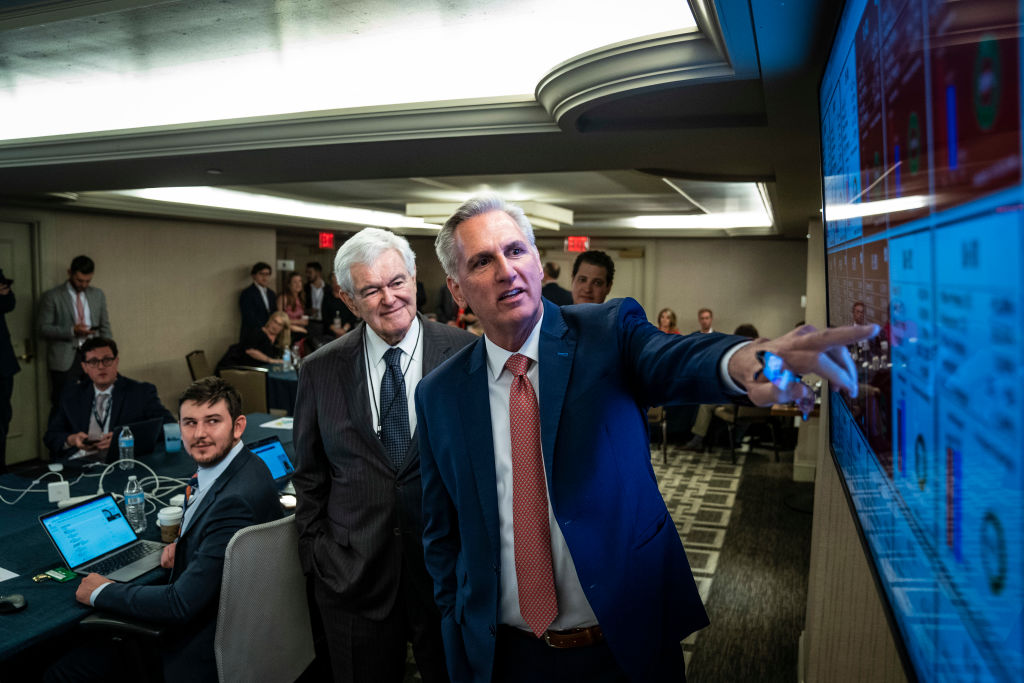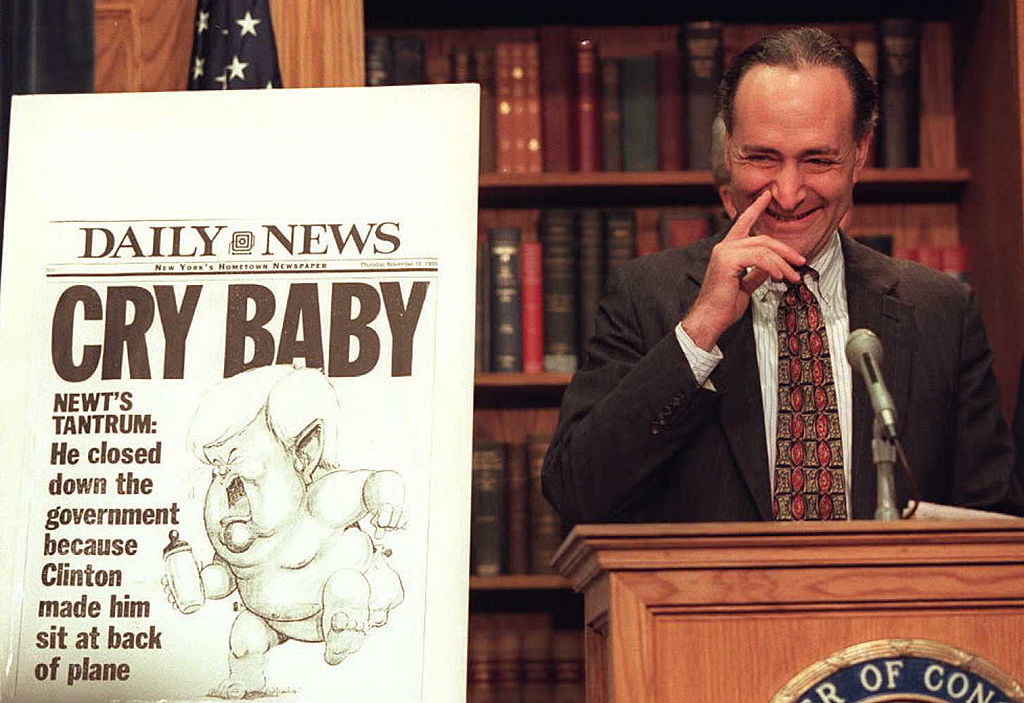
This article is part of The D.C. Brief, TIME’s politics newsletter. Sign up here to get stories like this sent to your inbox.
It has seldom been clearer that the current leadership of the Republican Party has zero interest in studying the lessons of history.
In the way-way-back days of 1995, a flight home from Israel arguably sparked a new era of politics that haunts us to this day, one in which a government shutdown could be considered a proportional response to a political slight and impeachment a logical option when all else fails. This week, another trip to Israel from a different House Speaker may presage yet another government calamity, possibly steeped in the same class of petty pique.
Flashback to November of 1995. President Bill Clinton had flown with a venerable who’s-who of Official Washington to the funeral of Israeli Prime Minister Yitzhak Rabin, who had been murdered by an Israeli extremist furious about the peace deal that had been negotiated in Oslo. The murder had shaken Clinton, who had put Rabin in a class apart from most leaders, viewing him as something of a father figure on par with Nelson Mandela of South Africa.
Senate Majority Leader Bob Dole—who would run against Clinton the following year—and House Speaker Newt Gingrich had been under the impression that they might get some time with Clinton on the flight home to talk about the looming government shutdown. Instead, Clinton stayed at the front of the plane in his cabin, playing cards with newspaper publisher Mort Zuckerman; Dole and Gingrich sat in steerage and stewed. As George Stephanopoulos noted in his memoir, White House aides worried that the boss might flub in private talks with the GOP leaders at that moment. Those same aides also insisted that Dole and Gingrich exit Air Force One on the rear steps, the ones used by political aides and traveling reporters.
Gingrich was furious about the perceived snub and not quiet about it, either. “You land at Andrews Air Force Base and you’ve been on the plane for 25 hours and nobody has talked to you and they ask you to get off the plane by the back ramp,” Gingrich told reporters over breakfast. “It’s petty.”
(Worth noting: Clinton and Gingrich had conversed earlier on the trip. And the White House had even secured space on Air Force One for Gingrich’s then-wife Marianne, while denying seat requests from former First Ladies Rosalynn Carter and Barbara Bush.)
Things broke against Gingrich, and bigly. “Cry Baby” was the infamous New York Daily News headline over a photograph of a diapered Gingrich on the House floor. He would later call the comment his “single most avoidable mistake” as Speaker.

Gingrich, hungry for retribution, shut-down the government for five days and then 21 days. Although there had been previous shutdowns—seven in the 14 years that preceded these—most were measured in hours and largely fell on weekends when no one was showing up for work anyway. In the next elections, voters decided to keep Clinton in power.
The legacy of those Gingrich shutdowns is impossible to ignore. It wasn’t just that it introduced the open-warfare mentality that bedevils Washington to this day and instructs the most cynical of its operators. In a neo-liberal bit of Bibling: a bad seat on Air Force One begat a shutdown that begat a pizza party that begat a married President meeting a donor’s kid named Monica Lewinsky when everyone who really mattered had been sent home that begat the first impeachment since Reconstruction that begat today’s toxic politics. (Credit, due here, to NBC’s Steve Kornacki’s masterful book on this era for this narrative.) It’s tough to imagine a Lewinsky-era impeachment scandal without the preceding bad seating assignment.
Now more than a quarter of a century after the Clinton-Gingrich spat, the current Republican Speaker of the House is channeling that same pluck and pettiness to punish a Democratic President, and an Israeli P.M. once again is serving as something of a political football. And, as before, the stage management of it all seems ham-handed.
House Speaker Kevin McCarthy was in Israel this week, as a standoff back home over the debt ceiling threatens a global meltdown. Biden has yet to publicly invite Prime Minister Benjamin Netanyahu back to Washington given the Israeli leader’s recent push to change his country’s judiciary in ways that critics call autocratic; Netanyahu reclaimed power in December after a struggle to build a coalition that rivaled McCarthy’s own efforts to hold together a fragile governing majority.
McCarthy took the opportunity to troll Biden over both the debt ceiling impasse and his frosty relationship with Netanyahu. “The President still hasn’t talked to me. I’m a little bit like Netanyahu,” McCarthy said while in Jerusalem. (Within hours, the White House announced that Biden had invited party leaders to meet next week). He also told the Israel Hayom, a newspaper owned by the Adelson family—powerful megadonors to Republican and pro-Israel causes—that Netanyahu was still plenty welcome in D.C., even if the sentiment wasn’t matched at the White House. “It’s been too long,” McCarthy said of a Netanyahu visit. “If that doesn’t happen, I’ll invite the prime minister to come meet with the House. He’s a dear friend, as a Prime Minister of a country that we have our closest ties with.”
A short time later, McCarthy repeated the invitation/threat, making crystal clear that he was positioning himself firmly between the U.S. President and Israeli Prime Minister—all while the underlying challenges of Middle East peace and security seem as uncertain as ever. One can’t help but hear echoes of the 1995-96 government shutdowns that reached breaking points over unrelated skirmishes spilling out into public view.
For a lot of others in Washington, the Netanyahu invitation is an echo of 2015, when Speaker John Boehner brought Netanyahu to speak to a Republican-driven Congress in an attempt to embarrass a seething Democratic team watching from the White House and trying to keep power. Eight years ago, it was seen as an election-year stunt meant to serve as a face-off with then-President Barack Obama over Iran’s nuclear program. At least 58 Democrats—plus then-Vice President Joe Biden—skipped it. Now, it’s Obama’s former understudy who has been seen as insufficiently supportive of Netanyahu’s return to power and erasure of judicial rights.
To be clear: Gingrich and McCarthy have a vastly differing political acumen. Gingrich wielded power without apology as the GOP claimed the majority in 1994 for the first time in 40 years, while McCarthy’s Speakership hinges today on keeping his unruly narrow majority placated. Yet both men have apparently used a visit to Jerusalem as cover to justify some pretty childish reactions to Presidents of a different party.
The American Presidents, too, are far from the same: one was a Southern Democrat who lionized Rabin, the other a career pol who is, at best, indifferent to Netanyahu. Yet Biden has adopted something of a Clintonian response to the threats, telling Republicans to send him a clean debt ceiling bill and they can talk. For unified Democrats, the GOP version that cleared the House last month is a non-starter because it pairs the hike to the debt ceiling with trillions of dollars in cuts that specifically target Biden’s domestic priorities. It’s dead-on-arrival in the Senate, where Democrats have the majority.
On top of the debt ceiling crisis, the Republican-led House has to sort out a spending plan for the full government—or at least find a stopgap measure—by Sept. 30, as well as renewing popular programs that feed kids and insure properties in flood zones before Oct. 1. All of those proposals will need to not only clear McCarthy’s House caucus but win 60 votes in the Senate.
Put simply: there is still a whole lot on Washington’s desk right now. Which makes it all the more curious on Monday when McCarthy trolled Biden over Middle East alliances and then doubled-down in a meeting with reporters. It’s almost like everything from the 1990s is new again—and that no one in McCarthy’s circle has spent much time studying how that all ended for the GOP.
Make sense of what matters in Washington. Sign up for the D.C. Brief newsletter.
More Must-Reads From TIME
- The 100 Most Influential People of 2024
- Coco Gauff Is Playing for Herself Now
- Scenes From Pro-Palestinian Encampments Across U.S. Universities
- 6 Compliments That Land Every Time
- If You're Dating Right Now , You're Brave: Column
- The AI That Could Heal a Divided Internet
- Fallout Is a Brilliant Model for the Future of Video Game Adaptations
- Want Weekly Recs on What to Watch, Read, and More? Sign Up for Worth Your Time
Write to Philip Elliott at philip.elliott@time.com